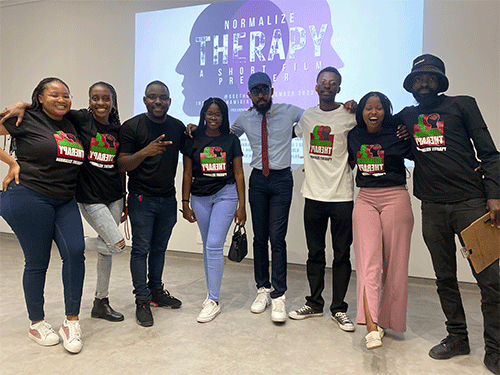The term edutainment has come a long way in the entertainment space as a tactic to educates or informs while also providing some amusement at the same time.
A new local short film ‘Normalise Therapy’ also uses the concept of edutainment to debunk myths around the stigma attached to seeking therapy.
“Some people believe something has to be wrong with you in order for you to do therapy. However, this is not the case; therapy can be a way of addressing issues,” said writer and director of the film Martin Kapuka.
He told VIBEZ! mental health has a lot of layers, explaining that it’s a broad subject and one of the objectives of this film campaign is to create awareness through engagement within society, including respective health professionals to be better informed about mental health matters, through edutainment.
“To influence and educate our communities, we need to do it through edutainment. We need to tell our own stories that can resonate with our society’s cultures and beliefs so that when we provide solutions to real-life problems affecting our communities through films, they can easily be understood and adapted.”
“If we are not creating films addressing matters affecting our communities, the western media will continue to saturate our market with their stories and influence our identity by writing our stories for us,” he stated.
‘Normalise Therapy’ is a short film, 22 minutes long, featuring Nafimane Halweendo as the main character supported by Theopoline Hatutale, Tangeni Sitahani, Leah Ndalulilwa, Colleen Matiti, Maria Helmuth, Urias Ngodji, Elinaty Shifotoka, Laurentius Mahongo, Hans Hango, Brandon Angola.
Nafimane Halweendo Legal Practitioners and Row Media Solutions assisted with funds and input to produce the film.
“Goethe Institut Namibia came on board and made the premier possible. It’s safe to say, this project was priceless; perhaps it’s the essence of the subject as mental health matters; organisations want to play their part,” shared Kapuka.
Getting the message across is important and the right cast need to have the ability to deliver that, Kapuka said.
Main character Halweendo told VIBEZ! it was an honour to work with such a young and vibrant team.
“The script was original and the issues were raised in a creative way. I feel extremely privileged to be part of the initiative,” he said.
Another contributor to the short film and first-time actor is Maria Helmuth who realised there is so much more she can do within the industry.
“Overall, this film is so relatable to most Namibians and its focus was on the reality, things that we see every single day. I realised that in our country, we lack knowledge on therapy. Many people don’t see the importance of it, so I hope this film can actually change that mentality in many and help people to get the message that is being delivered from the film,” she stated.
Find the film on YouTube.



